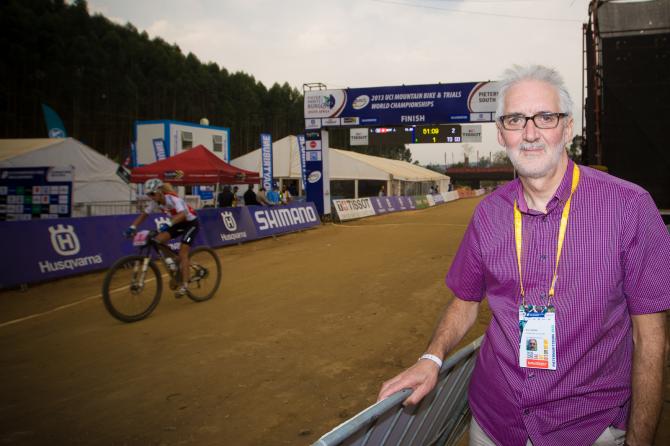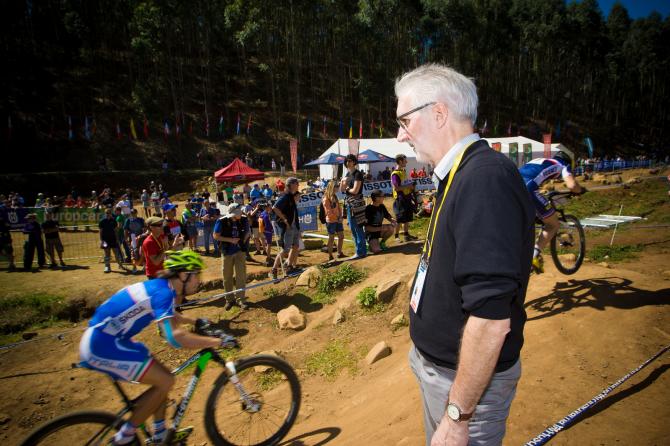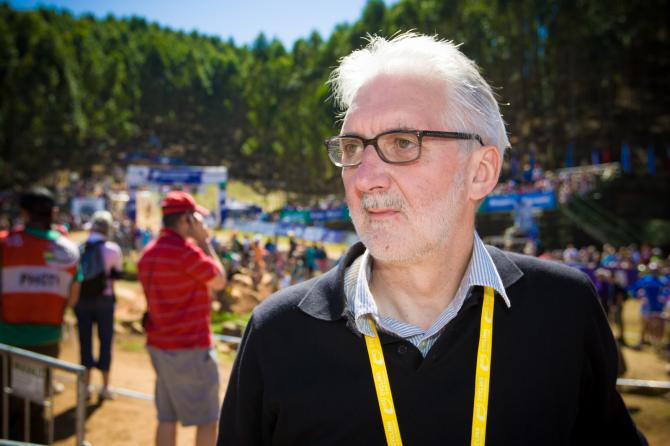UCI Presidential Candidate Cookson talks mountain biking, Part 2
Thoughts on enduro, minimum salaries and successful Olympic racing



As the UCI Presidential election nears, there has been plenty of talk about men's and women's road cycling by both candidates, but what about mountain biking? Cyclingnews sat down at the recent UCI Mountain Bike World Championships in Pietermaritzburg, South Africa and talked with UCI Presidential candidate Brian Cookson about his vision for mountain biking.
In part 2, of the interview with Cookson, he fills us in on enduro racing, the successes of recent Olympic cross country racing, minimum salaries for pros and his experience in Great Britain and how it might translate to being president of the UCI if he wins the election.
Read part 1 of the interview.
Cyclingnews: What are your thoughts on the emerging mountain bike discipline of enduro?
Brian Cookson: Enduro is an interesting element of the sport. I think it's important to try to keep it within the UCI, in terms of managing it and helping it develop.
To me, it's interesting culturally and sociologically that different groups of people get involved in promoting different things. They put their hearts and souls and passion into what it is that specifically interests them. That's a good thing, and we should try to channel that and support that. We should do that with enduro.
It's interesting how mountain biking evolves very quickly. That's because there are new people coming in all the time and getting excited and seeing potential for doing different things. Getting a balance between understanding mountain biking and promoting it on a consistent basis at the international and Olympic level has got to be counterbalanced by looking for innovation.
The latest race content, interviews, features, reviews and expert buying guides, direct to your inbox!
CN: Any thoughts on cross country and the Olympics?
BC: I guess ultimately the IOC doesn't really like innovation that much, and it's very difficult to change things. Hence, the emphasis on cross country - it was a discipline that the IOC could understand. You go around in laps and so on...
The circuit that was used in London [for the Olympics in 2012] was fantastic from a TV point of view. In previous Olympic mountain bike cross country races, particularly in Athens, the riders kind of disappeared into the forest and occasionally came out. That wasn't much of a television spectacle, which is important for the Olympic Games because not everyone can be at the venue. A lot of success is determined by the size of the television audience.
I thought that in terms of developing healthy mountain biking, the London Olympic events were really good. It just shows that you can enhance particular disciplines by letting them evolve over a period of time. When cross country first got into the Olympics, it was with longer courses disappearing out into the countryside and forest, and now to me, at the international level, cross country mountain biking is getting very similar to cyclo-cross in a sense. You're talking about an hour-long for 'cross and an hour and three quarters for cross country mountain biking. Sure, the bikes are different and the terrain are different, but the two are coming closer together, which is an interesting phenomenon.
CN: What about minimum salaries for mountain bike pros?
BC: I've got plenty of views on this one, and I've often been misquoted about them. Yes, it would be a great thing for minimum wages to be paid to professional athletes in all of the disciplines. Professional sport isn't that easy. It isn't simple. The economics of professional sport in any sport are very complex. Simply passing a rule saying that there shall be a minimum wage for professional cyclists, whether it's men or women, won't of itself generate that sort of money. All it will mean is that teams that currently call themselves professional will re-address themselves as amateur teams or whatever.
I think, yes it's a good idea that women road riders and women mountain bikers should have a minimum salary, and what I've discussed with a number of women, including Marianne Vos and others like her, is that it's always difficult for us men to have opinions on women's issues. We're in a no win scenario.
Some of the women I spoke with share my concern that if you just pass a rule, all you will do is force a lot of teams to disappear altogether. I think you have to be careful of the law of unintended consequences. I would never say that women don't deserve to have a minimum wage. Of course, they do. Their commitment is just as great.
Even on the men's side, the minimum wage is problematic. I'm not convinced that some of the teams that actually claim to be paying a minimum wage actually do. You hear stories of all sorts of things like riders having to bring their own personal sponsors into teams. It's one thing to have a rule, and it's another thing to actually make it work.
What we really have to do is put our effort into increasing the attractiveness of the sport to increase commercial sponsors so there is more money in the sport and therefore better salaries can be paid. Part of the issue we have at the moment is that we need to increase the size of the cake, not just the size of the slice of the cake. We want bigger slices all around.
The problem is that cycling has not yet been attractive enough to big enough sponsors. Part of the problem is due to the credibility of the sport due to the ongoing doping sagas.
For instance, you've got the whole of Germany, which has already been very successful at mountain bike Worlds, and they don't have a single sponsored pro road team. I don't think they have much in the way of pro mountain bike teams either, and there is no cycling on television. That's the biggest economy in Europe, and it's a black spot for professional cycling and most of its disciplines. Until we start doing something about that as an organization, and we should be able to do something about that, we're just going to struggle on with the consequences with that. It affects all branches of the sport.
CN: What have you learned from Britain's experience that could be brought to the UCI?
BC: I've learned that turning a sport around is a long term project. You need to have a round of strategies to start with. Once you have a strategy that is sufficiently ambitious and appropriate to the sport, then you have to pull the people together and put the resources together. You then have to make sure that you keep to that strategy even though it may be challenged from time to time. Right people, right resources and right strategy and you have a chance of making the difference.
The big difference that we were able to make in Great Britain was that we could change the level of success we were having. We were very much a third rate nation in cycling for many years in all the disciplines with occasional flashes of brilliance like Chris Boardman. Barcelona in 1992 was our first Olympic medal in 76 years.
Starting in Sydney, we got a gold and silver and a couple of bronzes. We did even better in Athens. Each time, that meant more funding and more sponsors and so on. Then we got to Beijing in 2008 and got eight golds. You start to get on a roll and the big sponsors want a piece of the action. That's when Sky decided they wanted to be part of the British cycling at the highest level. They wanted to sponsor a pro team.
People were laughing when not long ago, I said a British rider could win the Tour de France within the next 20 years, and now we've had two in a row. It's not an accident. It's part of a long term, ongoing strategy.
Once you have some success, stabilize the organization and give it credibility and once you have good standards of governance and financial stability, then investors want to come in. People want to be part of that success.
This is an age when cycling has never been more popular around the world. It ticks so many boxes in the current era we're in - environment, transport, health - all of those kind of things, we should be one of the most popular sports worldwide. We've turned that corner in Great Britain. I rode the 100-mile sportive a couple of weeks ago and was on the start line with the Mayor of London. The Prime Minister wanted to come meet with us and launch a new initiative on investment in cycling infrastructure. We had Chris Hoy and Victoria Pendleton there.
Once you get a sport in a position where powerful and influential people want to associate with it, then you start to make real progress. The UCI is at the opposite end of that spectrum because of the credibility issues. People are reluctant to get involved because they fear that what they're seeing might still be a spectacle that isn't genuine.
I'm sorry to drop into road racing when we're talking about mountain biking, but when I was in the guest area at the top of Ventoux during the Tour de France and Chris Froome attacked, people were booing and whistling. That was a terrible thing to have happened. Because people have been cheated before - what they saw was actually a drug-fueled performance, then they now assume an exceptional performance now is also drug-fueled. I'm pretty convinced that it isn't in the case of Froome and Bradley Wiggins and the ones I'm aware of through being British. I'm convinced it's a cleaner peloton in road racing right now, and I'm pretty sure that's the case in mountain biking right now as well.
The public still doesn't accept what they're seeing as genuine and that's a failure of the UCI. We've got to do more. Lots has been done, but we have more to do. People don't believe in the independence of the anti-doping, and there are still some questions about the [Lance] Armstrong era and what was covered up and so on, if anything. I don't know the inside story of those years. I think it's time we had that investigation right up until the present day. That will start to bring credibility back into the sport. That starts to make the resolution of all these issues we've been talking about that much easier.
The UCI presidential election will be held on September 27.
Sue George is an editor at Cyclingnews. She coordinates all of the site's mountain bike race coverage and assists with the road, 'cross and track coverage.